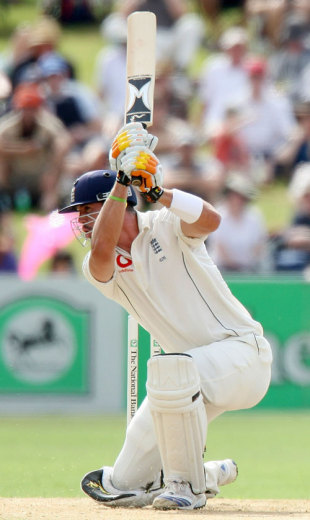
|

Show KP the money
© Getty Images
|
|
Who will pay for Kevin Pietersen's as yet unborn children's school fees? Allen Stanford, perhaps? Or how about the British Government? There's a novel idea. Not very Hello or OK, but real life for 93% of the British population.
I haven't heard any England players use the fact that the IPL is a massive global event, and the rest of the world's best players are involved, to justify their interest in playing in it, but rather the fact that there are pots of cash to be made.
When news broke of the Allen Stanford £10m match, Pietersen could barely contain himself,
salivating at the prospect of pocketing "a mill" for one match. Pietersen could never be accused of hiding his light under a bushel. He is as upfront off the field as he is on it. But every now and again, there's room for a bit of subtlety and perspective.
I don't begrudge England cricketers the big bucks, but I do begrudge them talking so shamelessly and aggressively about the means by which they think they can earn them. It's the sense of entitlement that rankles. I was chatting with Andrew Miller, Cricinfo's UK editor, the other day, and he made the point that 30 years ago, when World Series Cricket dawned, players were exploited yet treated like pariahs for taking Packer's money. In 2008, when England players are, by any sensible relative measure, very well paid, mention of their desire to make even more regardless of the consequences prompts nothing more than a well-you-would-wouldn't-you shrug of the shoulders.
Last September, Pietersen claimed fatigue as the reason for his atypically moderate performances, and he was right. England play a huge amount of cricket, too much without doubt. The northern hemisphere summer, which affords the majority of the rest of the cricket world a break, makes England cricket a 12-month-a-year operation. The price is burnout (see Andrew Strauss, Marcus Trescothick etc.), but the rewards are considerable. And the rewards are there regardless of achievement - although Giles Clarke, the ECB chairman, is trying to address that.
As England's limited-overs captain, Paul Collingwood is one of the most substantially remunerated in the squad, and last week at Lord's he admitted as much. "Central contracts have done a fantastic job over the last few years," he said. "They've given us time to get rest periods in, and we earn good money, there's no getting away from it."
But on the subject of the IPL, even he was aligned with his team-mates in his desire to have his cake and eat it. "The ECB are in a difficult position," he admitted. "We play all year round, so it's hard to get these competitions in among our schedule, but this tournament is a new thing, and it's hard to know how anybody will react. Hopefully we don't get into a situation where players have to make a choice, because that's what it's going to come down to."
I'm not generally disposed to feeling sympathy for the ECB, but on this issue I think it is between a rock and a hard place. Loyalty is an unfashionable concept in contemporary sport, and careers can be ended on the whim of a selector or the turn of an ankle. But for England players to force the ECB's hand in either allowing them to play in the IPL next year or fabricating this absurd winners-take-all match against Stanford's West Indies All-Stars (isn't that a contradiction in terms?) is just counter-productive.
England players should be able to play in the IPL because they should be able to pit their skills against their peers. Their presence would add to the event. But if England make a hash of trying to regain the Ashes next summer because they're too knackered, injured or distracted by the IPL or other sundry Twenty20 circuses, they will find themselves ridiculed or, worse, ignored by the British public.
John Stern is editor of The Wisden Cricketer

